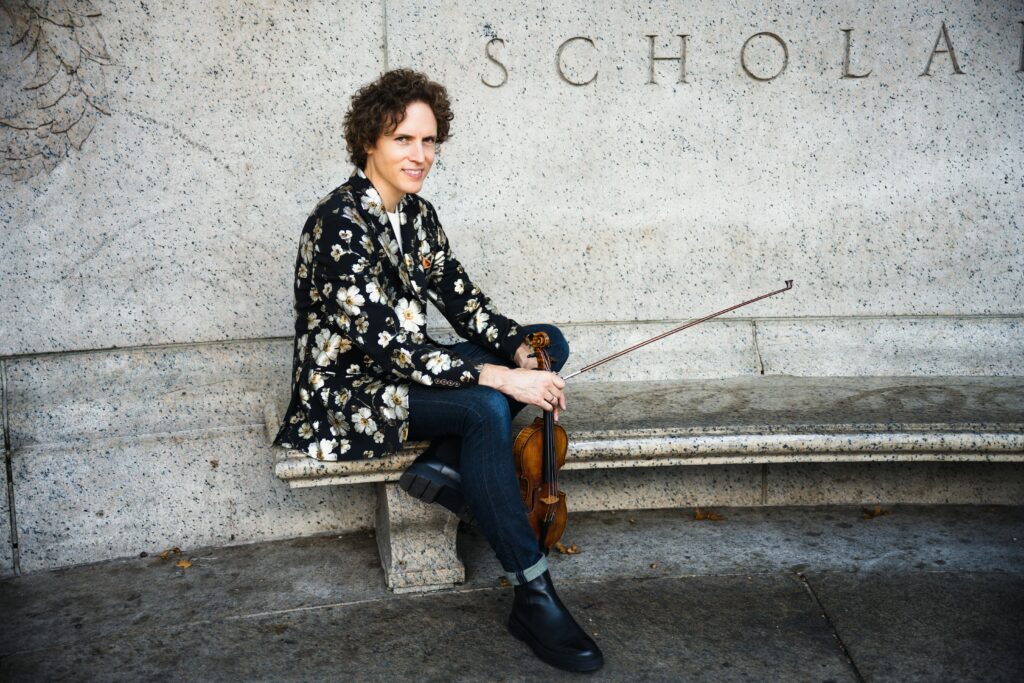
Shortest Way Home (2023)
PRIMAVERA V
from the composer
“Think you’re escaping and run into yourself. Longest way round is the shortest way home.” -James Joyce
While I did not intend in writing Shortest Way Home to allude to any particular spiritual tradition, nor to push back against one, as Joyce did toward his own Catholic upbringing, I was particularly inspired by cantorial prayer response from cantors such as Moshe Koussevitzky or Yossele Rosenblatt. I attempted to recreate a quality of full-voiced passionate melismatic singing and heartfelt declamation for the cello, also taking inspiration from the sounds of bells from churches in the French countryside.
I recall many moments when, as a violinist performing on-stage with Matt Haimovitz, I have been struck by his ability to bring an effortless lyricism to even the most challenging phrases. When Matt asked me to write a solo cello work for him, I knew that I would explore this quality of unabashed lyricism. I was also excited to push the instrument (and player!) to extreme limits of expression and pitch. With the broadest playable range of any of the string family, the cello is capable of pitches far up into the stratosphere which, proportionally on the violin, are borderline unlistenable even in the hands of the most skilled player. On the cello, they have a fragile expressive lyricism and other-worldly quality.
The juxtaposition of Botticelli’s and Charline von Heyl’s work, which is the central idea behind The Primavera Project, has also been of great interest to me. While these two paintings could not be more different stylistically, there is a feeling of returning “home” in the conceptual journey from Botticelli’s masterpiece to von Heyl’s painting, even if only in the shared title of their respective works. I am particularly interested in what “Spring”, or the seasons more broadly, mean in an era of global warming with growing concerns over unpredictable weather and global climate instability. If Botticelli’s work is about the transformation (through Chloris and Flora) from Winter into Spring, then von Heyl’s work speaks to a transformation from stability and safety, into instability and uncertainty. In my music, I’ve attempted to capture these opposing extremes of shape and color and also the deep lyricism in Charline von Heyl’s painting, whose sudden shifts in character and dynamic elicit a feeling of turmoil but with an underlying sense of hope.
Shortest Way Home is about being pulled back toward hope amid great sadness and uncertainty. The work combines lyricism and rhapsodic passion, beginning in the highest registers of the cello with a melody both melancholy and hopeful, lyrical yet frenetic and evocative of cantorial singing. As the mood begins to grow more optimistic, “bell peals” of broken chords and natural harmonics propel the music upward to a ringing and almost forceful exhilaration. It then returns “home” to the original inward mood of the opening theme, now transformed in a way that brings a moment of quiet peace as the work concludes.
bio
Avery Fisher Career Grant-winning violinist and composer TIM FAIN has earned a reputation as a mesmerizing creator and performer, now coming into his own as a composer with an authentic voice, recognized for his original compositions in film/TV, VR, concert music, theater, and extended media, and performances on soundtracks for award-winning feature films. Seen on-screen and heard in the soundtracks to award-winning films Black Swan, 12 Years a Slave, and Moonlight, Fain’s violin playing is also prominently featured in Glass, The Tragedy of Macbeth, Don’t Look Up, Indignation, and HBO’s Succession (where he also makes a cameo).
Fain composed the scores for award-winning films Munch and Los Huesos, media for The North Face and Ralph Lauren, Resonance, commissioned by Google/YouTube for a groundbreaking VR video, recorded by The Knights/Eric Jacobsen; Glacial, inspired by Antarctica’s melting Thwaites Glacier used by The Sierra Club, and violin concerto Edge of a Dream premiered with the Amarillo Symphony/Jacomo Bairos. His boundary pushing projects and VR experiences have landed him commissions with Google, Samsung, Facebook/Oculus, and Forbes, premiering at the Sundance and TriBeCa Film Festivals and SXSW, and features on BBC and PBS.
Whether touring with Philip Glass as duo partner, performing solo with the American Composers Orchestra at Carnegie Hall, or collaborating with artists ranging from Mitsuko Uchida to Meredith Monk, Bryce Dessner, DJ Spooky, Iggy Pop, or Christina Aguilera, Fain electrifies audiences all across the globe, even on-stage at the NYC Ballet, at The Vatican, and performing for the Dalai Lama’s 80th Birthday.
